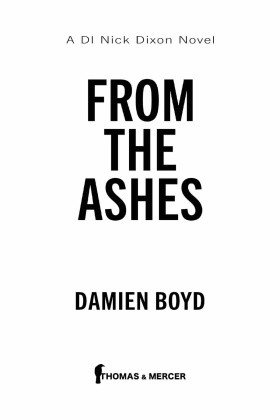Dixon spun round, but that turned out to be Hugget’s parting shot, the journalist now jogging across the road to his car.
The grass was long and wet, Dixon using the light on his phone as he weaved his way through the gravestones from the sanctuary of the tarmac path. Lights were on in the windows of the houses that backed on to the graveyard, several people visible, one looking through a pair of binoculars, his view partially obscured by a large weeping willow that stood guard over the dead.
Rain was falling, the drops visible in the glow from the tent, the sound of digging just carrying over the rain as Dixon approached.
It was his first exhumation and there was a lot at stake – not just the risk of looking like a bit of a wally, as Hugget had put it. If Thomas Fowler really was another victim, then all lines of enquiry thus far had been red herrings. All bets were off; it was back to square one and any other cliché Dixon could think of.
He stepped inside the tent, Louise watching the gravediggers at work, a large and growing pile of earth on a tarpaulin next to Thomas Fowler’s grave.
Donald Watson, the senior Scientific Services officer, was there, sitting on an aluminium box. ‘It’ll suit you better if he’s not a victim, I suppose, otherwise it’s back to the drawing board, isn’t it.’
And there was another.
‘Where’s the vicar?’ Dixon asked.
‘Been and gone,’ replied Watson. ‘Said a prayer before these lads started work and then legged it. He was only here a couple of minutes.’
One of the gravediggers stopped for a rest, leaning on his spade. ‘Do you want us to fill it in when you’ve got him out or shall we leave it?’
‘Leave it a couple of days,’ replied Watson. ‘Depending on the results of the post mortem, we may be releasing him for reburial straight away, or we may not.’
‘Oh, right.’
‘We’ll let you know one way or the other tomorrow.’
The rain was falling harder now if anything, a trickle running under the side of the tent and into the grave. The noise of the water on the outside of the tent was louder too, punctuated by drips from the overhanging branches of an oak tree. And the spade cutting into the soil.
Dixon’s phone buzzed in his pocket; a text from Poland.
How much longer?
He was tapping out a reply, only to be interrupted abruptly by the hollow thud of a spade hitting wood.
‘That’s him.’ The gravedigger straightened up, one hand in the small of his back. ‘Wasn’t too deep, because his wife’s underneath him.’
The gravestone plinth was still there, at the head of the grave, but the stone had gone, presumably to have Thomas Fowler’s name added to his wife’s.
Dixon deleted the message and tapped out another:
Reached coffin
Then watched the speech bubble, Poland typing something.
on way
Dixon stepped out into the rain and listened to the sounds all around him, the peace of the graveyard shattered by spades scraping the mud from a coffin lid, a mortuary trolley rattling along the path, phones ringing.
Someone was filming now from an upstairs window of one of the houses backing on to the graveyard, so he gestured to a uniformed officer.
‘Yes, Sir.’
It turned out that pointing at the cameraman was enough, the curtains snapping shut.
‘We’ll open the coffin at Musgrove Park,’ said Poland, striding along the path. ‘No point in doing it here.’
‘When will you do the post mortem?’ asked Dixon.
‘Straight away. That’s what you want, isn’t it?’
The gravediggers were using hand trowels to clear the earth away at both ends of the coffin as Dixon followed Poland back inside the tent. Then they placed straps underneath it and climbed out.
Dixon hesitated long enough to allow the mortuary assistants who had arrived to step forward and pick up the other ends of the straps.
‘It’s not been two months yet,’ said Poland, his voice hushed as the coffin was slowly lifted out of the grave. ‘So he shouldn’t be too bad.’
It was placed in an even larger wooden box, then covered in a black sheet before being carried across to the trolley that had been left out on the path.
Dixon looked into the grave expecting to see the wife’s coffin, but there was just bare earth.
‘The wife’s collapsed ages ago,’ said the gravedigger, spotting his curiosity. ‘So we dig down far enough, but not too far, if you know what I mean.’
‘If a journalist contacts you—’
‘He already has,’ interrupted the gravedigger, with a mischievous grin. ‘We told him to get stuffed.’

Dixon spotted the silver Ford Fiesta parked on the street when the convoy of vehicles turned into the car park at Musgrove Park Hospital. It pulled out behind him, and followed them round to the pathology department.

























